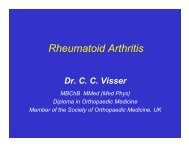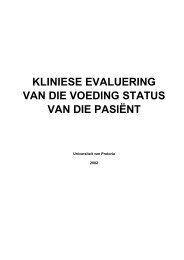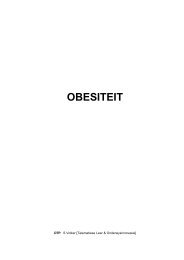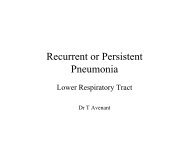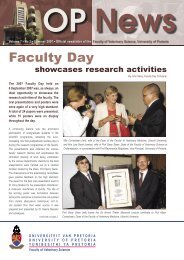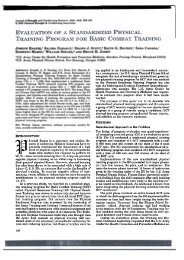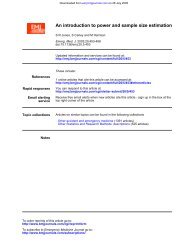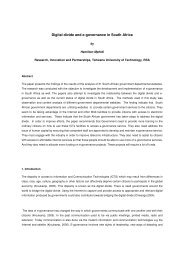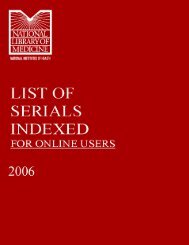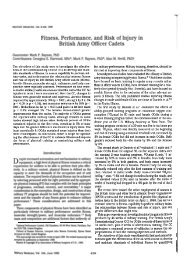NUTRITION INFANCY AND CHILDREN - University of Pretoria
NUTRITION INFANCY AND CHILDREN - University of Pretoria
NUTRITION INFANCY AND CHILDREN - University of Pretoria
You also want an ePaper? Increase the reach of your titles
YUMPU automatically turns print PDFs into web optimized ePapers that Google loves.
<strong>INFANCY</strong> <strong>AND</strong> <strong>CHILDREN</strong><br />
5<br />
_____________________________________________________________________________<br />
� Sore nipples: Usually because <strong>of</strong> keeping the baby on the breast for too long during the first 1-<br />
3 days (not yet enough milk).<br />
o Day 1: Only 1-3 minute on each breast.<br />
o Day 2: 3-5 minutes on each breast.<br />
o Day 3: 5-7 minutes on each breast.<br />
o Day 4: 7-10 minutes on each breast.<br />
Breast feed more <strong>of</strong>ten - it stimulates milk production.<br />
Direct sunlight 3pm will be effective.<br />
A nipple cream <strong>of</strong> zinc and Friar's balsam can also be effective.<br />
Because <strong>of</strong> the high incidence <strong>of</strong> psychiatric illness during the 3 months after delivery, it raises the<br />
possibility that psychotropic medication will be administered. Issues to address during analysis <strong>of</strong><br />
the risks and benefits <strong>of</strong> psychotropic use during breast-feeding include documented benefits <strong>of</strong><br />
breast-feeding, potential adverse impact <strong>of</strong> untreated maternal mental illness on infant attachment<br />
and cognitive and behavioral development, and the effects <strong>of</strong> untreated mental illness on the<br />
mother. Factors affecting medication concentration in breast milk are pH, protein lipid content<br />
(these vary throughout the postpartum period and at different times during a single feeding). Other<br />
major factors also include lactose, serum albumin, lysozyme, approximately 30 enzymes, prolactin<br />
and minerals such as calcium and phosphates.<br />
The extent to which an infant is exposed to medication is affected by<br />
� the rate <strong>of</strong> absorption into maternal circulation<br />
� diffusion from maternal circulation to breast milk<br />
� absorption <strong>of</strong> the agent by the infant.<br />
Taking medication immediately after breastfeeding minimizes the amount present in milk and<br />
maximizes clearance before the next feeding.<br />
Premature and full-term infants have a diminished capacity to metabolize medications for at least<br />
the first 2 weeks <strong>of</strong> life. The newborn kidney is also functionally immature (the glomerular filtration<br />
rate and tubular secretion are 20 to 40% <strong>of</strong> the adult kidney). For full-term infants, adult glomerular<br />
filtration rates are achieved between 2 and 5 months <strong>of</strong> life. The newborn blood-brain barrier is<br />
also immature (thus lipid-soluble agents can be 10-30 times more concentrated in the CSF than in<br />
serum).<br />
Specific drugs:<br />
� Tricyclic antidepressants: Safe when lactating.<br />
� Selective serotonin reuptake inhibitors: Safe in lactation, except for unconfirmed reports <strong>of</strong><br />
Fluoxetine causing colic and transient seizure-like activity at 3 weeks <strong>of</strong> age and<br />
unresponsiveness at 4 months (all events only reported by the mother and not witnessed by<br />
any medical personnel).<br />
� Antibiotics: Only 2 is safe in lactation, e.g. Penicillin and Erythromycin.<br />
� Painkillers: Only Paracetamol can be taken while lactating.<br />
� It is impossible to know every drug, but if in doubt, use a good reputable handbook for<br />
information on the use <strong>of</strong> the specific drug in lactation.<br />
� Generally speaking, it is safer to avoid all medications if possible while lactating.<br />
Copyright © <strong>University</strong> <strong>of</strong> <strong>Pretoria</strong>



